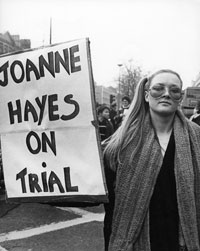4 March 2010 Edition
25 years later: The Kerry Babies witchhunt
 It was mediaeval. A group of men put a young unmarried woman on the stand and questioned her about the exact circumstances of the conception and birth and death of her newborn baby. She came from a tiny village in the West of Ireland. They had come down from the capital, Dublin. The Pope had just come and gone from Ireland. The men wondered aloud if the woman had in fact given birth to two newborn babies who had been found dead in Kerry, though blood tests showed that she could only have been mother to one. The men put forward and examined for six months a theory of superfecundation, which postulates that a woman can conceive of twins by two men if she has sexual intercourse with both in the space of twenty-four hours. “There were times when we all thought she had twins,” said presiding justice Kevin Lynch.”
It was mediaeval. A group of men put a young unmarried woman on the stand and questioned her about the exact circumstances of the conception and birth and death of her newborn baby. She came from a tiny village in the West of Ireland. They had come down from the capital, Dublin. The Pope had just come and gone from Ireland. The men wondered aloud if the woman had in fact given birth to two newborn babies who had been found dead in Kerry, though blood tests showed that she could only have been mother to one. The men put forward and examined for six months a theory of superfecundation, which postulates that a woman can conceive of twins by two men if she has sexual intercourse with both in the space of twenty-four hours. “There were times when we all thought she had twins,” said presiding justice Kevin Lynch.” It was mediaeval, but it happened in 1985. The probing of the woman’s sexual history brought the men gathered round her to such a fever pitch that she collapsed. She was excused, temporarily, and could be heard retching and sobbing in the corridor. The judge ordered that she be sedated and then brought back to testify. She gave evidence in a daze, her head bobbing off the microphone. The judge asked that her friends keep a suicide watch on her that night.
The country was sickened, and showed support for Joanne Hayes by sending her flowers and Mass cards. When the inquisition finally ended, the country rapidly changed, by constitutional vote, and a New Ireland came into being. It was forged on the anvil of Joanne Hayes’ suffering.
Never again, the changes showed, would one woman be held to blame for the ills that had beset Ireland. Or, at least, never again would an exclusively male panel of men sit in judgment of one woman.
With International Women’s Day on 8 March, it is timely to remember that the treatment of Joanne Hayes aged 24, who stood accused of no crime, was a model for Irish male attitudes to woman. She was caught up in a time of rapid social change between two Irelands, an earlier Ireland in which the Catholic Church had held a moral monopoly and a new liberal and secular Ireland.
The Joanne Hayes case is revisited by Nell McCafferty, journalist, playwright, civil rights campaigner and feminist, in her new book, A Woman to Blame: the Kerry Babies Case, to be published on 5 March.
